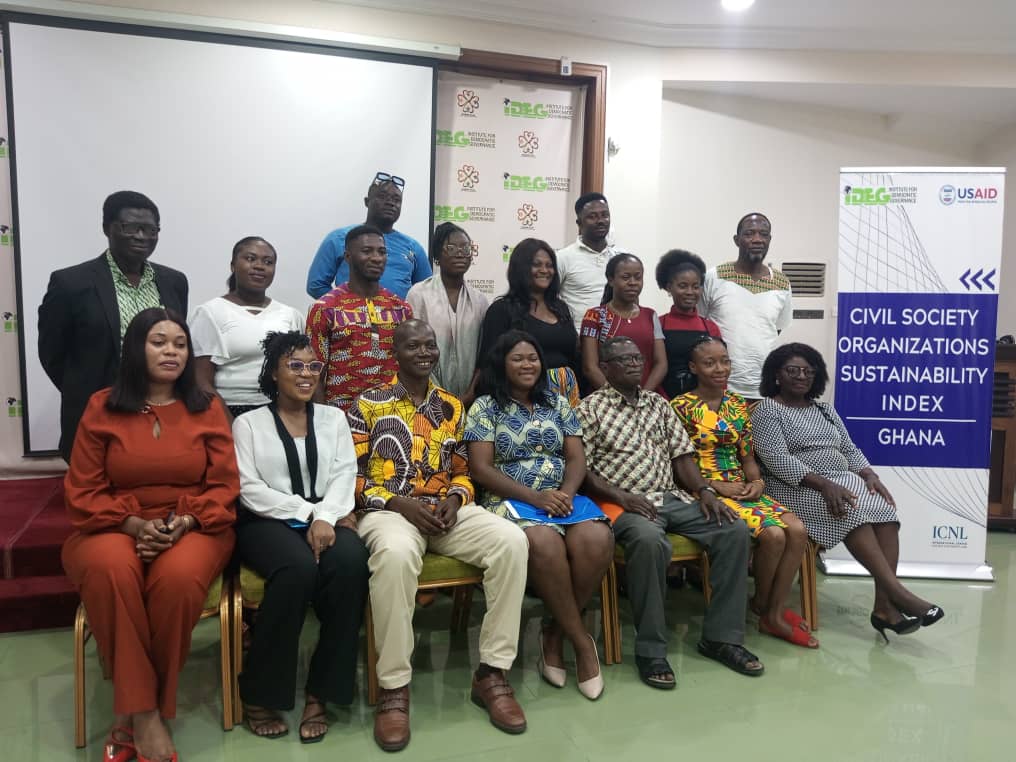By Iddi Yire
Accra, Oct 27, GNA – The Institute of Democratic Governance (IDEG), a development and governance solutions think-tank, has launched the 2022 Civil Society Organization Sustainability Index (CSOSI) Report in Accra.
The CSOSI assesses the capacity of the civil society sector to serve as both a short-term partner in implementing development solutions and a long-term actor in ensuring that development outcomes are sustained.
The USAID funded CSOSI annually reports on the strength and overall viability of civil society in the various countries that it covers
The 2022 CSOSI is the 15th edition since it was started in sub-Saharan Africa.
IDEG is the local implementer of CSOSI in Ghana.
Whereas the FHI 360 and the International Centre for Not-for-Profit Law (INCL) are the global managers and coordinators for the implementation of the CSOSI.
The CSOSI report describes advances and setbacks in seven dimensions affecting the sustainability of the civil society sector in the regions: Legal Environment, Organizational Capacity, Financial Viability, Advocacy, Service Provision, Sectoral Infrastructure, and Public Image.

Presenting the 2022 CSOSI report, Mr Douglas Quartey, Development Consultant/Author of Ghana CSOSI Report, noted that CSO sustainability was stable in 2022, with no changes in score recorded.
He said a total of 11,161 CSOs were registered with the Non-Profit Organisation Secretariat (NPOS) at the end of 2022.
Adding to that of this number, 687 organisations renewed their operations during the year, far fewer than 4,840 organisations that renewed in 2021.
He said the decline was attributable to the initial rush for operating permits after the launch of the NPO Policy in 2020; saying since then, fewer organisations had bothered to renew their operating permits.
Mr Quartey said the laws for CSOs registration remained favourable in Ghana.
He said under the revised Companies Act, 2019 (Act 992) and the NPO Policy approved in 2020, CSOs, like other business entities, were required to register with the Office of the Registrar of Companies limited by guarantee; they must then register with the NPOS as Not-for-Profit organisations to obtain operating licenses.
Touching on financial viability, Mr Quartey said foreign donors remained the main source of funding for CSOs.
He cited that the major donors in 2022 included multilateral and bilateral bodies such as the USAID, UK Aid Direct, the European Union, German Agency for International Cooperation, Embassy of the
Netherlands, Danish International Development Agency, and the United Nations Development Programme.
Dr Emmanuel Akwetey, the Executive Director of IDEG, lauded the role of NGOs in community development; stating that there was no community development in Ghana without NGOs involvement.
Professor Kwesi Jonah, Senior Research Fellow, IDEG, urged CSOs to tell their own stories to the Government and the private sector, so that they would understand that one could not have a viable democracy without a vibrant civil society organization.
GNA